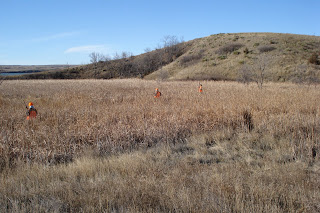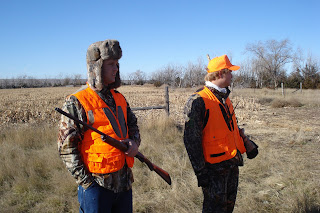Aaron, Scott, B.Row-Doug, Jesse, Adam, Travis, Rick

Recently my family, Scott Murtha and my brothers' girlfriend Kista Coleman, as well as the Williams family (minus Alisabeth) all traveled to a newly erected Hunting and Fishing Lodge on Lake Sharpe. The lodge is owned by my uncle, Kurt Grosshans and is currently for sale. It lies just 15 miles east of Pierre, South Dakota.
We arrived the night before Turkey Day. We hit it hard the next morning until about 3pm, returning for Thanksgiving dinner. Not to blow my own horn, but I was the leader in pheasant kills to this point, with two birds. There were several runner ups including Travis, Aaron, Rick and Doug.
Jesse, Aaron, and Adam flushing birds.
Jesse and Travis.
Aaron
The next day Adam got one, as well as Scott and Travis. Some injustice was served due to the fact that Travis and Scott aquired their kills strangely enough, near a commercial hunting outfit that raises birds;). All in all, we each had shares of opportunities that our bag numbers don't show, those damn roosters seem to fly just a lot faster than the clays!
Doug, Scott, Travis, Jesse, Aaron, and Adam
Travis shows this rooster no mercy as he cleans it in record time!
Chris displaying her very tasty and moist Turkey!
A close up is much needed to do justice here. Can you say perfection?
The finicky crowd was well pleased.
Left to Right; Kimberly, Scott, Doug, Kay, Jesse, Rick, Aaron, Adam, Travis and Kista.
Alex and the four homemakers, (Chris, Kay, Kim, and Kista) all did a wonderful job on the dinner. It was the Grosshans and Williams traditions in combination that had every palate pleased and each stomach in pain from the levels of consumption taking place. Competition was fierce too with the large number of heavy eaters in the crowd and so few delicious candied yams to go round.Even after all the hard work, Alex and the women got up at four am the next day to beat the crowds in the phenomenon known as Black Friday! This is a scary undertaking to say the least where shoppers risk life and limb to save outrageous amounts on their favorite items.
Scott and his Winchester X3, wins the award for best gun.
Scott attended 'Black Fridays' at Cabelas one year for a meat grinder and was able to save some 75% of the $100 regular price! The group on this trip arrived with several good buys and they all seemed exhausted but with a hint of accomplishment. The money they saved should allow much more cheer under the trees on that special day.
Alex, Kim, and Kista watching the boob tube.
Kimberly, practicing for a modeling career.
Later that night, Kimberly would realize that her older brother Jesse, is the most skilled beer pong player she has ever seen, and she has seen a lot! Travis was the current champion whose skills were developed in garages, basements, and even the occasional kitchen table, over the last few years. For this type of domination to take place on the first game is either beginners luck or pure talent. Only the future holds the answer, because everyone was too tired to continue!
A view of the Lodge from the highway.
The Lodge is a marvelous place overlooking Lake Sharpe, with beautiful views at sunrise and the occasional deer or pheasant to greet you. The group was in awe over Kurt’s creation. Everyone would love to come back again and again. No one wanted to leave and the place sure felt empty when we did. Sure you could stay at a hotel, but nothing beats waking up in the morning with a beautiful lake and 14 foot ceilings all in clad in wood as you prepare for a hunt. That’s heaven.
Aaron, Adam, Doug and Jesse taking a breather.
Rick, putting his shoes on. Doug, eating his favorite breakfast,Biscuits and Gravy.
Adam, Travis, Jesse and Aaron
Thanks Kurt, from all of us. We had a great time. And a special thanks to Rick, Doug, Chris and Kay for all the hard work to make this happen!



















































